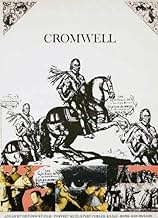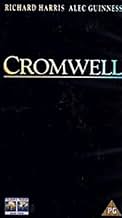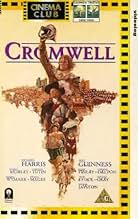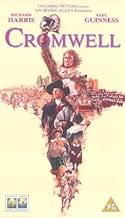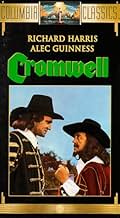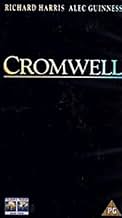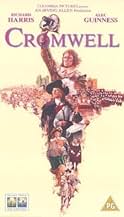Cromwell
- 1970
- Tous publics
- 2h 19m
Puritan statesman Oliver Cromwell leads England in a civil war against the absolutist and Catholic-sympathetic King Charles I.Puritan statesman Oliver Cromwell leads England in a civil war against the absolutist and Catholic-sympathetic King Charles I.Puritan statesman Oliver Cromwell leads England in a civil war against the absolutist and Catholic-sympathetic King Charles I.
- Won 1 Oscar
- 2 wins & 5 nominations total
- Director
- Writer
- All cast & crew
- Production, box office & more at IMDbPro
Featured reviews
Alec Guiness's king is impressive and his relationship with the catholic queen should have been more developed .Dame Dorothy Tutin's rendering is subtle and she makes all her scenes count.There is also Robert Morley and Timothy Dalton who give strong support.
Queen Henrietta took refuge in France and her daughter Henriette married the king Louis XIV 's brother ,"Monsieur" .Sadly she was to pass away at a very early age probably of peritonitis(few historians still speak of poisoning).
"Cromwell" ,which I saw when it was released ,has stood the test of time quite well,thanks to all these wonderful actors.In his own way,Cromwell was an incorruptible person ,ahead of his time,who predates Robespierre .The fact that he substituted a dictatorship for another one does not ruin his main revolutionary idea:a king is not infallible, the absolute monarchy means tyranny.A century and a half later ,minister Turgot told Louis XVI :"do not forget Charles the first,Sire!"
However, putting that to one side, the film version of Cromwell's growing involvement in the War is marginally accurate and well done. Richard Harris, as Cromwell, makes a decent effort although I do feel he makes too much of a theatrical job with the role, with far too much posturing, self-smugness, and above all shouting....
I can understand his unhappiness at the Royalists encroachment of the Common People's liberties; and I can understand him fully remonstrating his feelings in the House of Commons, but Harris seems to shout in nearly every scene. So much so that by the end of the movie he is struggling for breath.
Conversely, Alec Guiness's Charles I is far more intelligently done. Underplayed yet convincing & too some extents we feel more sympathetic to his plight. After all he has a rather scheming Cathloic French Queen, the Catholic Church and a lot of other distractions to occupy his mind and usurp his powers.
The battle scenes are convincing but don't carry the same kind of savagery than the more prosaic Braveheart. But the supporting characters do a good job and add a more rounded feel from Harris' turgid performance.
The directing blows hot & cold, sometimes the story drifts & meanders before pulling back into sharp focus; while the choreography is sweeping & rich in content. The musical score, however, seems tacky & amateurish, lacking any depth in conjunction with what's going on in the film.
However, for all its faults and historical inaccuracies, we do get a slightly better insight into a rather grim & dark chapter in England's turbulent history.
Cromwell is a good film but should be taken with a large pinch of salt as far as retelling history is concerned.
***/*****
However, the film has equally strong bad points. It tends to drag at many points and frequently gives the impression of being an overly drawn-out stage production that fails to be fully convincing. More serious, though, is the problem that, although presenting itself as historical, it plays fast and loose with history. It does not fully explain the causes of the Civil War or the differences of viewpoints within each side, especially the Parliamentarians, not all of whom were fighting for the same reasons. It portrays the Royalist forces as the flashy, well-equipped and stronger element when in reality the Parliament forces were not only much more numerous, but usually much better equipped as well (after all, it was not a war of rag-tag, grass-roots rebels trying to topple the government; each side represented in part one branch of the government and Parliament, not the king, was the body that held the purse strings). In addition, the Royalists often did quite well in battle despite their inferior forces. It clearly makes Cromwell out to be too important from the start: rather than being one of the key leaders in the beginning, he really started out as a military commander and simply rose to prominence over time. Finally, Cromwell, despite some of his autocratic tendency coming through, is still shown to be too much the reluctant, noble hero, and the film only hints at his other face, one which in short order made him none too popular in England, let alone Ireland. Needless to say, nothing is mentioned of his willingness to shed the blood of Royalists and Catholics, or to destroy historic architecture that conflicted with his Puritan views.
Secondly, yes there is some idea conveyed of the turmoil of the period; the Levellers get a slight, if ridiculously truncated, mention.
However, anyone who knows the slightest snippet about the period must have left the TV screen or whatever nothing but annoyed by the gross licence taken with the events of the civil war. And it is not just the fact that I have studied the period in depth that makes such glaring inaccuracies as:>
Cromwell being named as one of the Five Members, he wasn't.
Cromwell even being present at Edgehill, let alone rescuing the day. Neither are true. At the same time the "arrangement" between the officers of the opposing side which was so crucial to the film never happened; and, at the end of the day the Royalists did not actually win the battle. It was a draw. Okay, I can live with some details being slightly wrong, but the outcome of the entire engagement...?
Why miss out the most bloody, viscious and, many would say, crucial battle of the war? At least at Marston Moor Cromwell was actually there.
Naseby, too, was grossly misrepresented: a) Cromwell did not command the parliamentary forces, Fairfax did; and b) in reality the Royalist force was just over half the size of that of parliament: hardly the stunning victory of a smaller force led by Cromwell as portrayed in the film.
The Civil War was in no way Catholic versus Protestant: both sides were Protestant and, to be technical, both were mostly heartily opposed to Charles' Laudianism (a kind of mixture of the two). However in 1970 some scholarship did maintain this so this mistake can perhaps be understood.
These are just some of the many nitpicking points that seem to preclude the idea that "Cromwell" provides "an excellent history lesson". However, "Appocalypse Now" and "The Thin Red Line" are both examples of historically inaccurate but still highly effective and powerful films. How come "Cromwell" fails on this count? Well, on the one hand neither of these, more recent, films even claim to portray real people -"Cromwell" does and therefore its stubborn disregard of the truth cannot be ignored. Then, on the other hand, if the film attempts to be more than just a reasonably nice looking swashbuckler (which it does) and to really look into the character of its protagonists then surely its case is harmed by these shocking errors. For example, how can the film attempt to portray Cromwell as a man made by his times (rather than the other way around) when it suggests that he was a significant player from the start. Before the outbreak of Civil War Cromwell had made just one vaguely significant speech in parliament. He was never contacted by Pym before the call of Parliament and there was no question of him ever leading the armies of Parliament until the retirement of Fairfax on the eve of the (curiously unmentioned) Second Civil War. Indeed he did not become official leader of the country until 1653. His rise to power was a great surprise to him and his countrymen.
Finally, why miss out Ireland completely from the equation when surely there is no more interesting aspect to the man's character than his opinions on religion?
Cromwell deserves a more accurate cinematic perspective, and surely half of the problem is that this film attempts to cram the ten most monumental years of British history into three hours.
Definately a "could do better".
The Civil War was not a conflict over religion, although it played it's part. It was about "the divine right of kings", against the governance of, by and for the people, i.e. Rex v Parliament. Divided loyalties and opinions were split right across the board.
The capital charges of treason brought against the king was, to my mind, not altogether trumped up, and had some validity. However it was of course a "show trial", and to bring it about the laws had to be changed rapidly. There was no edict at the time that allowed anyone to put a monarch on trial. Issac Dorislaus (a Dutch lawyer) came to the rescue of Parliament. He wrote an order that would enable it to set up the court. This order was based on an old Roman law which stated that a military body (in this case the Parliamentary forces) could legally overthrow a tyrant. Naturally Charles I did not agree, either to this law, or that he was a tyrant. He was still the King, still the Head of State, and as such, above the law. He could do as he wished, and was answerable only to God. For him it was an unfortunate way of looking at things.
The casting of this movie was extremely well thought out, but with one exception. Cromwell himself. I'm not criticising Richard Harris in any way. He played the role superbly, but I'm sure he didn't have an Irish accent. Also he had some extremely noticeable warts on his face which Richard Harris did not. Had the make-up artists gone on vacation? To his credit Richard overcame this miscasting, and acquitted the characterisation of the brusque, complex, and religiously enigmatic Oliver Cromwell with great fervour and passion, and I doubt if anyone else could have done it any better.
On the subject of accents, I wonder whether or not the Scottish accent adopted by Alec Guinness was apt. As Charles I left Scotland at the age of 4, and lived in England until his death, surely he would have cultivated an English one? True he had a Scottish tutor, but I'm still left to wonder. Perhaps someone could set me right.
(Just as a byline, I find it curious that Richard Harris, being an Irishman, accepted the part. In the greater part of Ireland the very name of Oliver Cromwell is loathed and reviled, and for good reason, so it says much for Harris's devotion to the acting profession that he actually did.) Being a musician, I was highly amused at seeing (and hearing) bugles played on horseback during a 17th century battle, reminiscent of the US 7th cavalry. Such instruments weren't developed to such an advanced stage until late into the following century (the 18th).
As another reviewer has noted, Cromwell was certainly not one of the "Five Members" who were to be removed from the House and arrested. These were: John Pym, John Hampden, Denzil Holles, Sir Arthur Haselrig and William Strode. A sixth man, Lord Mandeville (the future Earl of Manchester) was also to be taken.
There are quite a few more historical mistakes and omissions on which other reviewers have remarked, and I don't intend to repeat them. But in defence of the producers it must be said that "The English Civil War" was a momentous stage in British, perhaps even world history, and to illustrate it all in a couple of hours is impossible. Much as Shakespeare, when writing "Henry V", managed on a small stage to capture the flavour of Agincourt and events leading up to it, so this production coped well with a similar task on film. Therefore if certain liberties were taken, and artistic licence used, I think they can, in this case, be excused. Should it have encouraged one student to scuttle towards the history books (or now websites), to learn more about the whole period, then I would say it was a job well done.
Did you know
- TriviaWhen writer / director Ken Hughes said to Richard Harris that no self-respecting Irishman should ever play Oliver Cromwell, Harris laughed.
- GoofsCromwell was not one of the Members of Parliament named for arrest in the King's warrant. Cromwell was not present in Parliament at the time the King and his troops entered the House of Commons. The scene of he alluding that The King is a traitor actually happened with John Elliott some ten years prior.
- Quotes
King Charles: I do swear that hold this England and its laws dearer to my heart than any here. But gentlemen, if you would reduce me to a figurehead - a puppet king, manipulated by parliament - how then would I serve my country? What manner of king would I be?
Oliver Cromwell: I am persuaded, Your Majesty, that England must move forward to a more enlightened form of government, based upon a true representation of a free people. Such an institution is known as... "democracy", sir.
King Charles: Democracy, Mister...
Oliver Cromwell: Cromwell, sir.
King Charles: Democracy, Mister Cromwell, was a Greek drollery based on the foolish notion that there are extraordinary possibilities in very ordinary people.
Oliver Cromwell: It is the ordinary people, my lord, who would most readily lay down their lives in defense of your realm. It is simply that "being ordinary", they would prefer to be asked - and not told.
- ConnectionsFeatured in 52nd Annual Academy Awards (1980)
Details
- Release date
- Countries of origin
- Language
- Also known as
- Cromwell - Der Unerbittliche
- Filming locations
- Production companies
- See more company credits at IMDbPro
Box office
- Budget
- £3,750,000 (estimated)
- Runtime2 hours 19 minutes
Contribute to this page




